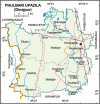Building community resilience during COVID-19: Learning from rural Bangladesh
- PMID: 40478069
- PMCID: PMC9111107
- DOI: 10.1111/1468-5973.12405
Building community resilience during COVID-19: Learning from rural Bangladesh
Abstract
The COVID-19 pandemic has brought overwhelming challenges to developing countries which are already resource-constrained and lack adequate social safety nets. Specifically, lockdown has adversely impacted marginalized communities (e.g., labourer, fish wholesaler and small business owner) and informal sector employees who rely on meager daily wages for their survival. Set in the contested climate of the emergency response to the COVID-19 outbreak in Phulbari, Dinajpur, Bangladesh, we examine the early response of the community to the pandemic. Drawing on 24 in-depth interviews with members of this community, we find that the existing central and regional government structure has failed to deal with the crisis. Yet, we show how collective effort at the local community level, led by volunteers and community leaders, is crucial in the fight against hardship during lockdown.
Keywords: Covid‐19; community resilience; crisis; lockdown; marginalized community.
© 2022 The Authors. Journal of Contingencies and Crisis Management published by John Wiley & Sons Ltd.
Figures
Similar articles
-
Strategic assessment of COVID-19 pandemic in Bangladesh: comparative lockdown scenario analysis, public perception, and management for sustainability.Environ Dev Sustain. 2021;23(4):6148-6191. doi: 10.1007/s10668-020-00867-y. Epub 2020 Jul 18. Environ Dev Sustain. 2021. PMID: 32837281 Free PMC article.
-
Lessons learned from pandemic response to COVID-19 in Bangladesh: NGO-based emergency response framework for low- and middle-income countries.BMC Health Serv Res. 2023 Jun 20;23(1):656. doi: 10.1186/s12913-023-09643-w. BMC Health Serv Res. 2023. PMID: 37340495 Free PMC article.
-
Understanding rural local government response during COVID-19-induced lockdown: perspective from Bangladesh.SN Soc Sci. 2022;2(10):216. doi: 10.1007/s43545-022-00516-3. Epub 2022 Sep 29. SN Soc Sci. 2022. PMID: 36193448 Free PMC article.
-
Intersecting factors of disadvantage and discrimination and their effect on daily life during the coronavirus pandemic: the CICADA-ME mixed-methods study.Health Soc Care Deliv Res. 2025 Feb;13(2):1-185. doi: 10.3310/KYTF4381. Health Soc Care Deliv Res. 2025. PMID: 39949202
-
From kinship networks to culture of relatedness: a shift of safety nets during health pandemics in the kenyan context.Front Public Health. 2023 Jun 19;11:1062962. doi: 10.3389/fpubh.2023.1062962. eCollection 2023. Front Public Health. 2023. PMID: 37404272 Free PMC article. Review.
References
-
- Abdalla, S. M. , Koya, S. F. , Jamieson, M. , Verma, M. , Haldane, V. , Jung, A.‐S. , Singh, S. , Nordström, A. , Obaid, T. , & Legido‐Quigley, H. (2021). Investing in trust and community resilience: Lessons from the early months of the first digital pandemic. British Management Journal, 375, 067487. 10.1136/bmj-2021-067487 - DOI - PMC - PubMed
-
- Aijazi, O. , & Panjwani, D. (2015). Religion in spaces of social disruption: Re‐Reading the public transcript of disaster relief in Pakistan. International Journal of Mass Emergencies & Disasters, 33(1), 28–52.
-
- Aldrich, D. P. (2017). The importance Uof social capital in building community resilience. In W. Yan, & W. Galloway (Eds.), Rethinking resilience, adaptation and transformation in a time of change (pp. 357–364). Springer.
-
- Aldrich, D. P. (2019). Challenges to coordination: Understanding intergovernmental friction during disasters. International Journal of Disaster Risk Science, 10, 306–316.
-
- Aldrich, D. P. , & Meyer, M. A. (2015). Social capital and community resilience. American Behavioral Scientist, 59, 254–269.
LinkOut - more resources
Full Text Sources

